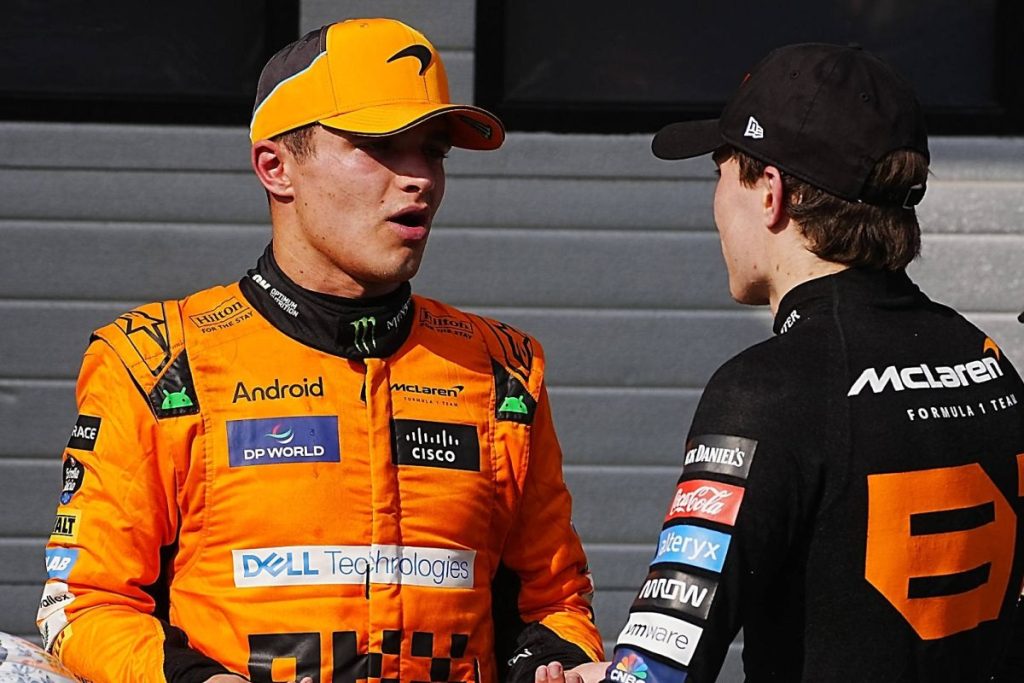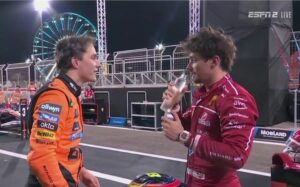Just in:McLaren driver announcement causes stunning back…read more

McLaren driver announcement causes stunning back…read more
McLaren’s recent social media post featuring a playful AI-generated image of a fictional event, the “Moon Dog Grand Prix,” has sparked significant backlash among fans, with many criticizing the team for using artificial intelligence to create promotional content instead of supporting human artists. The image, which was shared by McLaren in collaboration with driver Oscar Piastri, was the result of Piastri experimenting with an AI image generator. In a lighthearted tone, Piastri posted the generated poster on his social media, humorously suggesting, “The Moon Dog Grand Prix, let’s make it happen.”
While Piastri himself seemed to enjoy the playful idea, the response from McLaren’s fans was far from positive. On the team’s official Instagram page, a wave of disappointment poured in, with many users accusing McLaren of undermining the work of professional artists by promoting AI-generated content. One user voiced their displeasure, stating, “Sad that you’re promoting AI and not supporting the hardworking artists who create gorgeous (and frankly much better) posters for your team on social media.” This sentiment was echoed by several other followers, with one commenting, “Love you guys but let’s promote real artists instead of AI, please. By doing this, you’re supporting art theft
.”
The controversy deepened when McLaren shared a second image showcasing another AI-generated piece of artwork created by Piastri. Fans continued to express frustration over the team’s decision to promote such content. One commenter argued, “Fans with common sense don’t support AI, and before anyone will yell at me – yes, I’ve seen the video with Oscar, and I still think this is wrong.” The criticism extended beyond Instagram, spilling over to Twitter, where another user expressed disbelief, writing, “All that constructor’s championship money and you couldn’t be bothered to hire a real artist?”
The controversy sparked a broader debate about the role of AI in creative industries, particularly in the realm of art and design. Many individuals raised concerns that using AI to produce content, especially by large organizations with ample resources like McLaren, could negatively impact professional artists, who rely on their craft for a living. Some argued that the use of AI not only devalues the work of human artists but also raises ethical questions about the rights to intellectual property and originality. The backlash reflects a growing divide in opinions on the use of AI within the creative sector and its potential consequences for human talent.
Supporters of AI technology, however, often point out that the tool can serve as a creative aid, allowing for new forms of expression and helping to streamline certain tasks. In Piastri’s case, it appears the driver intended the “Moon Dog Grand Prix” concept to be a lighthearted and humorous project, rather than a serious marketing campaign. The AI-generated poster was not meant to replace professional design work but to provide a fun, quirky idea. Piastri himself seemed to enjoy the playful nature of the concept, further highlighting that the intention behind the post was not to criticize or undermine human creativity but to have a bit of fun with the idea.
However, McLaren’s decision to share the AI-generated content as part of an official promotional campaign raised concerns about the team’s priorities. Critics argued that McLaren, as a high-profile Formula 1 team with substantial financial resources, should have used the opportunity to support traditional artists and showcase their work instead of promoting a product generated by an AI system. This criticism intensified as fans pointed out that McLaren could easily afford to hire talented human designers for their promotional material, yet chose to rely on technology that some felt was actively contributing to the devaluation of traditional art.
The debate over AI in creative industries is not new, but this incident highlights the tensions between innovation and tradition. As AI continues to advance, its role in various sectors, including art, design, and entertainment, will likely become even more contentious. While some may view AI as a valuable tool for expanding creative possibilities, others remain deeply concerned about its potential to displace human talent and undermine artistic integrity.
Ultimately, McLaren’s AI-generated “Moon Dog Grand Prix” may have been intended as a fun and lighthearted project, but it has opened up a larger conversation about the ethical implications of using AI in creative work. While the controversy may have been sparked by a simple social media post, it underscores a growing divide in how people view the intersection of technology and traditional creative industries, particularly the impact of AI on professional artists’ livelihoods.







